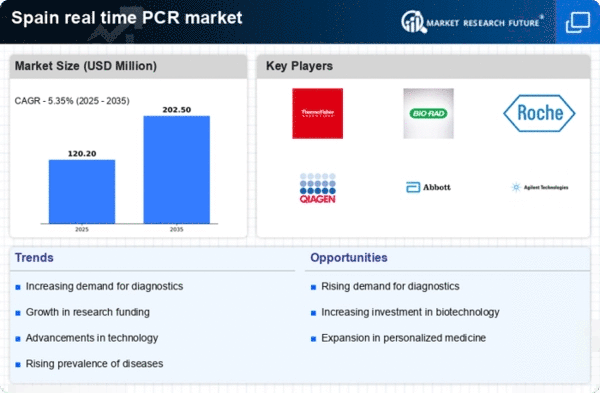Growing Focus on Genetic Testing
The growing focus on genetic testing is significantly influencing the real time-pcr-qpcr market in Spain. As awareness of genetic disorders and personalized medicine increases, healthcare providers are increasingly utilizing real time-pcr and qpcr technologies for genetic testing applications. This trend is supported by the rising prevalence of hereditary diseases and the demand for tailored treatment options. In 2025, the genetic testing market in Spain is projected to expand by approximately 20%, which will likely drive the demand for real time-pcr-qpcr systems. Additionally, collaborations between healthcare institutions and genetic testing companies are expected to enhance the availability of these technologies, further solidifying their role in modern diagnostics.
Rising Prevalence of Infectious Diseases
The increasing incidence of infectious diseases in Spain is a crucial driver for the real time-pcr-qpcr market. As healthcare providers seek rapid and accurate diagnostic tools, the demand for real time-pcr and qpcr technologies is likely to surge. According to recent health statistics, infectious diseases account for a significant portion of morbidity in the country, prompting healthcare systems to invest in advanced diagnostic solutions. This trend is expected to enhance the market landscape, as hospitals and laboratories prioritize the acquisition of real time-pcr-qpcr systems to improve patient outcomes. Furthermore, the Spanish government has been actively promoting initiatives aimed at strengthening public health infrastructure, which may further bolster the adoption of these technologies in clinical settings.
Integration of Automation in Laboratories
The integration of automation in laboratories is likely to transform the real time-pcr-qpcr market in Spain. As laboratories strive to enhance efficiency and reduce human error, the adoption of automated real time-pcr and qpcr systems is becoming more prevalent. Automation not only streamlines workflows but also increases throughput, allowing laboratories to process a higher volume of samples in a shorter time frame. In 2025, it is anticipated that the market for automated systems will account for over 30% of the total real time-pcr-qpcr market share in Spain. This shift towards automation is expected to attract investments from both public and private sectors, further propelling the growth of the market as laboratories seek to optimize their operations.
Advancements in Molecular Biology Research
The ongoing advancements in molecular biology research are propelling the real time-pcr-qpcr market in Spain. Researchers are increasingly utilizing real time-pcr and qpcr techniques to explore genetic variations, disease mechanisms, and therapeutic targets. The Spanish scientific community has been receiving substantial funding for research projects, which has led to a proliferation of studies employing these technologies. In 2025, it is estimated that the research funding allocated to molecular biology in Spain will reach approximately €500 million, indicating a robust growth trajectory. This influx of resources is likely to stimulate innovation and drive the demand for real time-pcr-qpcr systems, as researchers seek to enhance the accuracy and efficiency of their experiments.
Regulatory Support for Diagnostic Innovations
Regulatory support for diagnostic innovations is emerging as a significant driver for the real time-pcr-qpcr market in Spain. The Spanish regulatory authorities have been streamlining the approval processes for new diagnostic technologies, thereby encouraging manufacturers to introduce advanced real time-pcr and qpcr systems. This supportive regulatory environment is expected to foster competition among market players, leading to the development of more efficient and cost-effective solutions. In 2025, the market is projected to grow by approximately 15% due to these favorable regulations, as healthcare providers increasingly adopt innovative diagnostic tools to meet the rising demand for accurate testing. The proactive stance of regulatory bodies may also enhance public trust in these technologies, further driving their adoption.
















